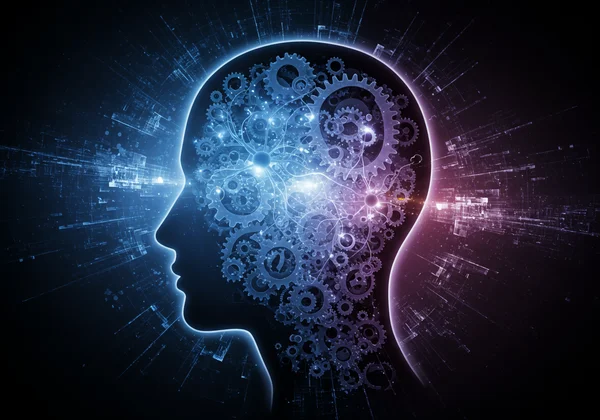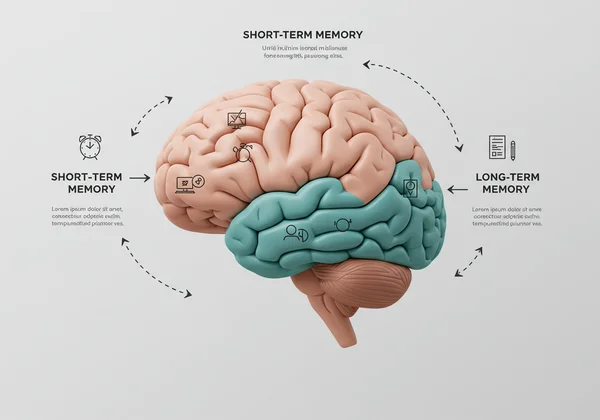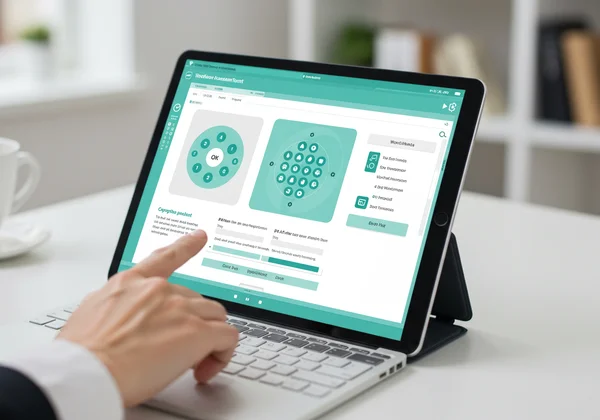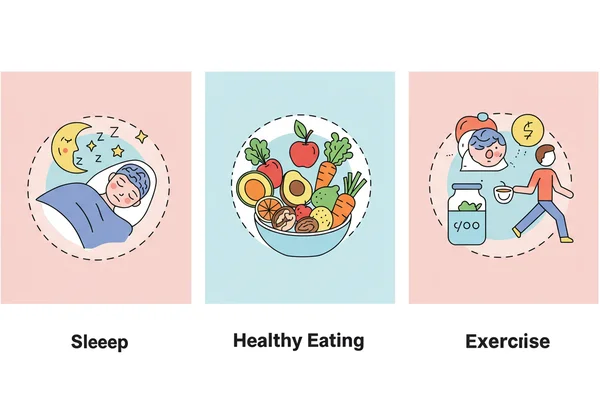Cognitive Assessment: Types, Memory Tests, & Brain Boosting Strategies
October 11, 2025 | By Gideon Albright
Are you constantly misplacing keys, forgetting names, or struggling to recall recent events? Memory lapses are a common concern, but understanding how memory works and how it's assessed is the first step toward improving it. Many people wonder, How can I test my cognitive ability at home? The good news is that modern tools make it easier than ever to gain insights into your brain's performance. This guide will take a deep dive into the fascinating world of memory, exploring its different types, how a cognitive assessment helps measure it, and actionable strategies to enhance your brain's recall ability.
Understanding your cognitive profile is a powerful step towards personal growth and brain health. A well-designed AI-powered cognitive assessment can provide the clarity you need to begin this journey. This article will serve as your map, guiding you through the complexities of memory and empowering you to take control.

Understanding the Landscape: Key Types of Memory
Memory isn't a single entity; it's a complex system with different components working together. Think of it like a library with various sections for different kinds of information. To truly understand your cognitive strengths and weaknesses, it's essential to recognize these distinctions. A comprehensive memory test doesn't just ask if you remember something; it investigates how you remember it.
Short-Term vs. Long-Term Memory: A Crucial Distinction
The most basic division in memory is between short-term and long-term storage. Short-term memory is your mind's temporary holding area, keeping information for a few seconds to a minute. It's what you use to remember a phone number just long enough to dial it. This capacity is limited, typically holding around seven items at once.
In contrast, long-term memory is the vast, durable storage system for your knowledge, experiences, and skills. Memories here can last a lifetime. Information is transferred from short-term to long-term memory through processes like repetition and association. Understanding the health of both systems is crucial for a complete picture of your cognitive function.
Working Memory: Your Brain's Active Workspace
Often confused with short-term memory, working memory is a more dynamic and active system. It's the mental "scratchpad" you use to hold and manipulate information simultaneously. When you calculate a tip in your head, follow a complex set of directions, or participate in a conversation, you are using your working memory.
This cognitive skill is fundamental for reasoning, problem-solving, and learning. A decline in working memory can make everyday tasks feel more challenging. Fortunately, it's also a skill that can be measured and trained. An online cognitive assessment from CognitiveAssessment.net often includes specific tasks to evaluate how effectively your working memory is functioning, providing a clear starting point for improvement.
Beyond Basics: Semantic, Episodic, and Procedural Memory
To add more nuance, long-term memory can be further categorized. Understanding these sub-types helps appreciate the rich tapestry of your mind's recall abilities and how they contribute to your overall brain function.
-
Semantic Memory: This is your encyclopedia of general knowledge—facts, concepts, and ideas about the world. Knowing that Paris is the capital of France is a semantic memory.
-
Episodic Memory: This is your personal scrapbook of past experiences. Remembering your first day of school or what you had for breakfast this morning are examples of episodic memories.
-
Procedural Memory: This is the memory for skills and habits, often performed automatically. Riding a bike, typing on a keyboard, or brushing your teeth all rely on procedural memory.

How Cognitive Assessments Evaluate Your Memory Skills
A cognitive assessment is more than a simple quiz; it's a structured evaluation designed to measure various cognitive abilities, including the different types of memory. These assessments provide objective data on your performance, helping to identify areas of strength and potential challenges that might not be obvious in daily life.
What a Memory Test Reveals: Beyond Simple Recall
A thorough memory test goes beyond just asking you to memorize a list of words. It evaluates different facets of memory to create a detailed profile of your recall ability. For instance, it might assess:
- Immediate Recall: How well you can remember information immediately after it's presented.
- Delayed Recall: Your ability to remember that same information after a period of distraction.
- Recognition: Whether you can identify previously learned information when it's presented among new items.
- Visual vs. Verbal Memory: Differentiating your ability to remember what you see versus what you hear or read.
By analyzing these different aspects, you get a much clearer picture of where your memory processes are strongest and where they might need support.
The Role of Online Cognitive Assessment Tools
In the past, a comprehensive cognitive evaluation required a visit to a specialist's office. Today, technology has made these powerful tools more accessible than ever. An online cognitive assessment allows you to evaluate your cognitive health from the comfort of your home. These platforms use a series of scientifically designed tasks to measure memory, attention, and executive functions.
The key advantage of AI-driven platforms is their precision and personalization. By analyzing your unique response patterns, an AI-powered system can deliver a detailed report that goes beyond a simple score. It can highlight your cognitive profile, translate data into actionable insights, and offer personalized recommendations. To understand your own cognitive profile, you can begin a comprehensive cognitive assessment today.

Interpreting Your Memory Assessment Results
Receiving your assessment results is the first step on a path to greater self-awareness. It's important to view these results not as a "pass" or "fail" grade, but as a roadmap. A good report will break down your performance across different cognitive skills, explaining what each score means in a real-world context.
Look for a report that outlines your strengths and identifies areas for improvement. The goal is empowerment—using this newfound knowledge to make informed decisions about your brain health. Whether it's adopting new lifestyle habits or engaging in targeted cognitive exercises, your results can guide you toward a sharper mind. A great way to begin is to receive your personalized cognitive report.
Enhancing Your Recall: Science-Backed Strategies to Improve Memory
Understanding your memory is one thing; improving it is another. The brain has an incredible capacity for change, a concept known as neuroplasticity. By adopting certain habits and practices, you can actively support and even enhance your memory functions. Here are some science-backed strategies to help you on your journey.
Lifestyle Habits for a Sharper Brain
Your brain's health is deeply connected to your overall physical health. Simple lifestyle adjustments can have a profound impact on your cognitive vitality.
-
Prioritize Sleep: Sleep is when your brain consolidates memories, transferring them from short-term to long-term storage. Aim for 7-9 hours of quality sleep per night.
-
Eat a Brain-Healthy Diet: Foods rich in Omega-3 fatty acids (like fish and walnuts), antioxidants (like berries and dark leafy greens), and flavonoids (like cocoa and green tea) support brain function.
-
Engage in Regular Exercise: Physical activity increases blood flow to the brain and promotes the growth of new neurons. Even a brisk 30-minute walk several times a week can make a difference.

Cognitive Exercises and Mental Stimulation
Just like your muscles, your brain benefits from a good workout. Engaging in mentally challenging activities helps build cognitive reserve and strengthens neural connections. Consider incorporating cognitive exercises into your routine.
Activities like learning a new language, playing a musical instrument, or engaging with puzzles like Sudoku or crosswords can keep your mind sharp. The key is to find activities that are both challenging and enjoyable. To understand which cognitive areas to focus on, it's helpful to understand your cognitive baseline with an initial assessment.
Mindfulness and Stress Reduction for Better Memory
Chronic stress is a major enemy of memory. The stress hormone cortisol can damage the hippocampus, the brain region critical for forming new memories. Practicing mindfulness and other stress-reduction techniques can protect your brain and improve your ability to recall information.
Activities like meditation, deep breathing exercises, and yoga can help lower stress levels and improve focus. Even taking a few minutes each day for quiet reflection can enhance your mental stimulation and create a better internal environment for memory formation. Taking a moment for an online brain health check can be a great form of self-care.
Disclaimer: This tool is designed for educational and informational purposes. It is not a substitute for professional medical advice, diagnosis, or treatment. Always seek the advice of your physician or another qualified health provider with any questions you may have regarding a medical condition.
Take Control: Your Path to a Healthier, Sharper Memory
Your memory is a vital part of who you are, but it's not a fixed trait. It's a dynamic skill that you can understand, measure, and nurture. By learning about the different types of memory, leveraging the power of cognitive assessments, and implementing science-backed strategies, you can take proactive steps toward a sharper, more resilient mind.
The journey begins with a single step: gaining clarity. An AI-powered cognitive assessment provides the personalized insights you need to understand your unique cognitive profile. Stop wondering about your memory and start understanding it.
Ready to unlock your cognitive potential? Explore our AI-driven cognitive assessment on our homepage to receive your detailed report and begin your journey to better brain health today.
Frequently Asked Questions About Memory Assessments
What questions are asked in a cognitive assessment? A cognitive assessment uses a variety of tasks, not just questions. These can include remembering patterns, matching shapes, recalling lists of words, solving simple logic puzzles, and reacting to on-screen prompts. The goal is to evaluate different cognitive domains like memory, attention, and executive function in a standardized way.
How can I test my cognitive ability at home? You can test your cognitive ability at home using a scientifically validated online tool. Platforms like our AI-powered assessment tool offer a comprehensive, AI-driven assessment designed by neuropsychologists and AI experts. It provides a convenient and reliable way to get a detailed report on your cognitive skills without leaving your home. You can access our free cognitive assessment tool to get started.
What happens if my cognitive test results are concerning? Receiving a result that highlights a potential challenge is not a diagnosis; it's a data point. It provides you with valuable information to take the next step. The best course of action is to share your report with a doctor or healthcare professional, who can provide context and recommend further evaluation if necessary.
How do you tell if you have cognitive decline? Signs of cognitive decline can be subtle and vary from person to person. They might include more frequent memory lapses, difficulty with problem-solving, struggling to find words, or getting lost in familiar places. If you or a loved one are experiencing these symptoms, taking a baseline cognitive assessment test and speaking with a doctor is a proactive and responsible step.
At what age should you consider a memory test? There is no "right" age. Many people choose to take a baseline test in their 40s or 50s to track changes over time. It's particularly recommended for individuals concerned about memory changes, those with a family history of dementia, or anyone who wants to proactively manage their brain health as part of a wellness routine.